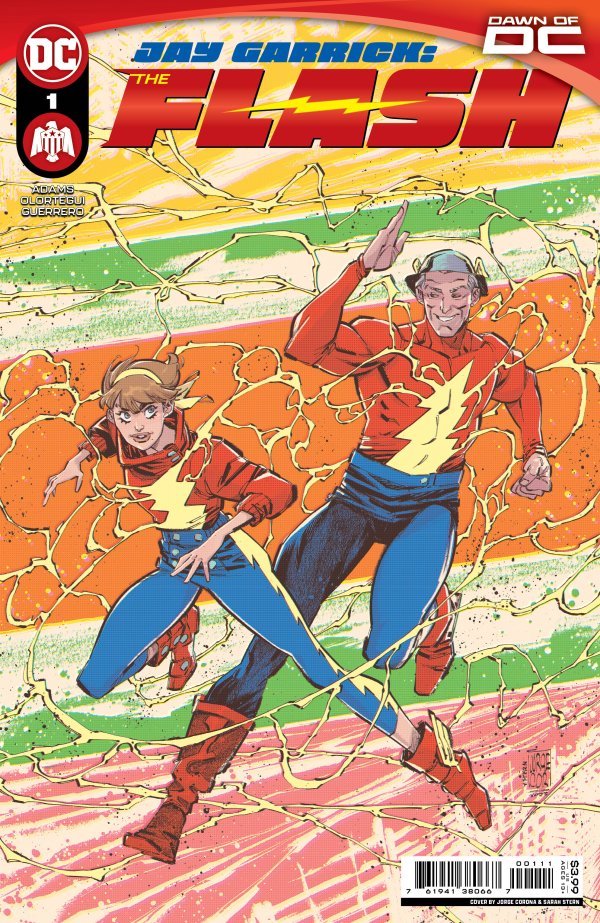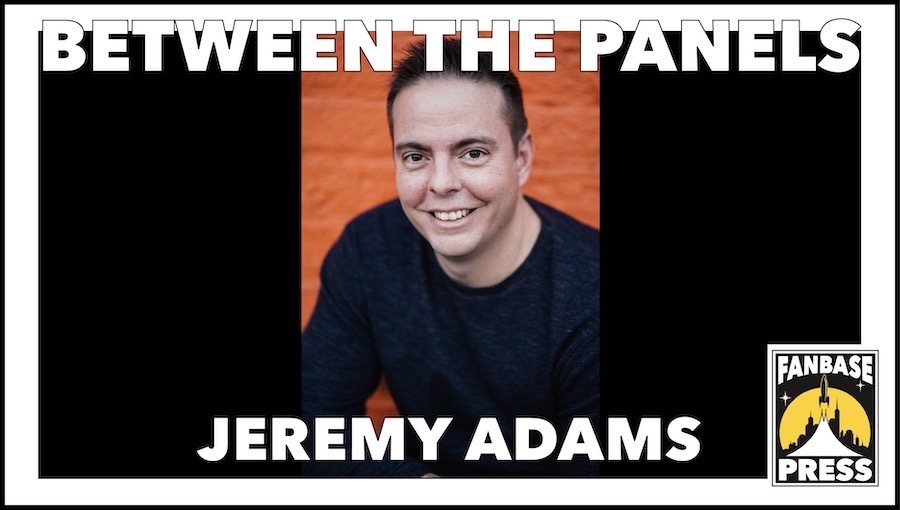“Between the Panels” is a bi-weekly interview series focusing on comic book creators of all experience levels, seeking to examine not just what each individual creates, but how they go about creating it.
Since getting his foot in the door at DC Comics, Jeremy Adams has written two of the company’s biggest titles: The Flash and Green Lantern. Those two credits are impressive enough, but what fans who know Jeremy only from comics may not realize is the long, winding writing path — and all the other credits — that ultimately led him to this medium.
First off, the basics…
Your specialties (artist/writer/letterer/inker/etc.): Writer
Your home base: Los Angeles, CA
Website: www.spacekicker.com
Social Media
Twitter: @spacekicker
Instagram: @spacekicker
Fanbase Press Contributor Kevin Sharp: I start with the same question for all guests: Why comics? For yourself, who has written in other collaborative media, what does the comics medium offer you that’s different from those?
Jeremy Adams: Good question. The best way to describe it is the feeling of live theater. There’s an immediacy to it that feels wonderful. With writing animation, you turn in a script and it could be two years before you can see the result. In live-action, it’s shorter, but still a substantial amount of time. With comics, it’s a pretty quick turnaround. Plus, it’s collaborative, but with a smaller group of people. It’s more… yours for lack of a better word. I find it incredibly fulfilling.
KS: Please tell readers where you grew up and how comics first entered your life. Newspaper strips? Spinner rack? Or did you have a local comic shop?
JA: I was born in a small desert town in Arizona, but I “grew up” in Prescott, Arizona. It was an idyllic childhood really, more akin to something out of a Mark Twain novel than anything else. Comics entered my life through my father. He had drawn a few books in the ’70s and ’80s, and although my parents were divorced early on, comics was a “safe place” to have something in common with my dad who wasn’t around. We didn’t have a comic store—well, one showed up for a glorious six-month span, but then… POOF!— so I’d find my comics at spinner racks at the local market, or in antique shops. There were many in my small town.
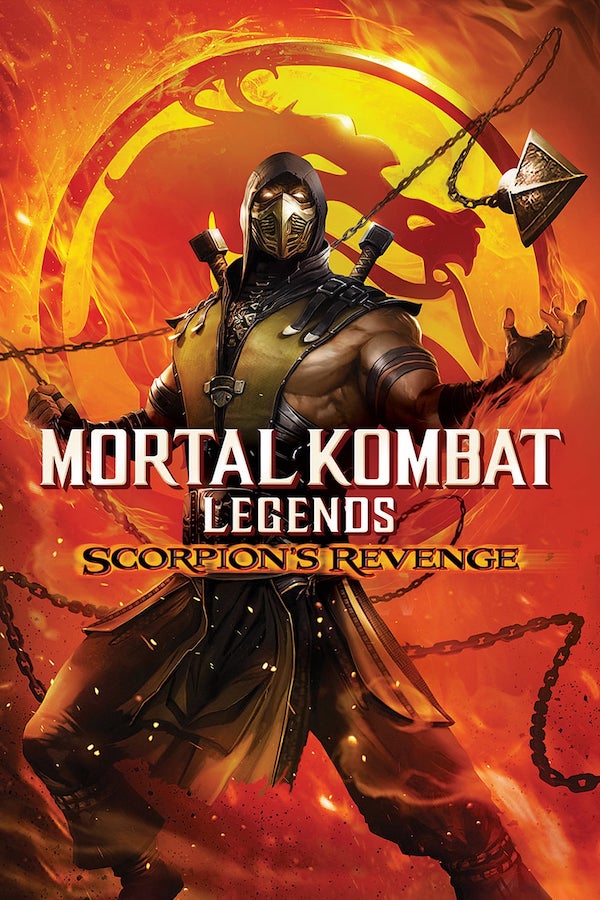
KS: What types of books did your dad work on?
JA: [He] drew for DC’s Ghosts with Doctor 13. He also did a run of Captain Atom books in the ’80s and, I believe, a couple of Alpha Flight.
KS: With artists, it’s easy to look back at the styles that captivated them with readers. But for a writer, do you recall when you first became aware of an “author’s hand” at work in things you read and which writers were on your wavelength?
JA: It’s funny, you’re right, I didn’t really think about who wrote them for a long time. I was just happy to read them. In retrospect, they were names like Mark Gruenwald and Chuck Dixon, but when I first remember thinking about who wrote the book, three names come to mind. There was, of course, Frank Miller. His Daredevil “Born Again” series was a game changer for me, and then there’s the great Giffen and DeMatteis of Justice League International. Whereas Frank Miller was incredible drama, G&D [were] hilarious and thrilling. I didn’t know comics could be funny. Transformed my brain!
KS: On that note, at Fanbase Press, our #StoriesMatter initiative endeavors to highlight the impact that stories can have on audiences of various mediums and about the way a reader can find an important story at just the right time. What was a particular comic book story that had a real impact on you when you were younger?
JA: Oh snap! Yes, the “Born Again” series, also the Gruenwald run of Captain America “Captain No More!” really captivated me. But, was there a bigger story that hit me at the right time more than the Dark Phoenix Saga? I don’t think so. My dad gave me the trade and I devoured it. It was intense. I was pumping my fist when Wolvie was in the sewers declaring, “Now it’s my turn!” and then so sad when Jean sacrificed herself. It was a roller coaster of emotions. What a fantastic book!
KS: Looking back, why was that the right story for you as a reader and a person at the time?
JA: Probably just my age. I was reading more “innocent” things prior to that. But here was a book with someone dying! Love lost, people hurt. It wasn’t a happy ending. I think that was different from everything I was reading, honestly. It was a great pivot point as I was entering adult(ish) hood.
KS: Flipping from you as a reader to a creator, was writing always your thing, or did you have other hobby loves first? What did your creative life look like growing up, as far as the types of things you made?
JA: I love writing. I never thought that was a thing I could “do,” but I’ve always loved it. I wrote my own comics as early as 3rd grade —still have them, too— but the revelation of what writing could do came around Junior High. I remember reading something I had written for my English class and the kids laughing at my jokes. Oh man, that is the greatest feeling ever. I didn’t realize the power I could wield! But, I loved making little movies, running around with friends, martial arts was huge for me —mostly for self-preservation reasons.
KS: Was that piece something for a class assignment?
JA: It was. The assignment was to take a piece of classic literature and then add your own chapter at the end. The story was The Jungle Book, if I recall correctly, and I added a character called “Pumpkinhead.” It was just super, super silly.
KS: Would the idea of having a creative career have been an “a-ha” moment of inspiration for you or something you’d had in mind for a while? I’m wondering if your dad would have been an inspiration in this regard…
JA: I’m sure my dad was an inspiration in a lot of ways, but not the way you might be thinking. We have what you call a strained relationship. My parents were divorced very young, so, obviously, to try and feel closer to him, I kind of imprinted on the things he liked—karate, comics, movies. Obviously, I was a kid, I had no idea about that sort of stuff, but looking back it seems pretty clear to me. For the “a-ha” moment, that came at freshman orientation at the University of Arizona. I was going to be a U. S. Marshal! I mean, sure, as a kid I’d make my own little movies, I’d draw my own little comic books, but I never, and I mean never, thought there was a career path to those sorts of things. Then one day, I’m in orientation. I had a folder that read “Criminal Justice,” the path I thought I was supposed to go on. And then… this indie-looking punk professor gets up and starts talking about the film department. The what now? I thought. I’m looking around, totally perplexed. You can go to school for this? I tossed the folder in the garbage and immediately signed up and never looked back.
KS: What was your vision entering college as far as where you wanted to go career-wise, literally and metaphorically, after that?
JA: After finding out that you could get a degree in film, that was it. I burned the ships. I went full-steam ahead. Sure, I’m full of imposter syndrome and fear about the future, but kept pushing. Writing letters to producers, directors, using every homework assignment —in film or not in film— to write a genre story, or film something. Eventually, I left Arizona and went to Los Angeles, not knowing a soul, really, and just kept pressing ’till something broke over a decade-plus later.
KS: Can you talk about the concrete steps you took to get your first break as a pro writer after making that move? Was there a balance between putting yourself in position to succeed with your talent vs. the kind of right place/right time “happy accidents” that can come along sometimes just when one needs them?
JA: This is a huge question. 1. You need to have something to show. I was out here for awhile, thinking that someone would just recognize my talent off the street without having to give them anything to prove it. A producer asked if I had written anything, and I just stared at him talking about half scripts and ideas and just generally feeling like an idiot. So, sitting down and writing no matter how small the amount every day, suddenly generated a lot of product. 2. Networking. Getting out and meeting people. Finding your “tribe” as it were. Then, those “happy accidents” become launch pads for something else. That’s what happened to me. I was going to a Doctor Who night with some people, and met this guy named Jim Krieg. He told me he was a writer, and I probably rolled my eyes. “Wasn’t everyone?” But one day, after being here for over a decade, my now wife (then girlfriend) and I were attending a church service about the “burning bush” — you know, the story of Moses and God. I left thinking, that’s what I need. I need God to tell me exactly what I need to do, no matter the hoops to jump through. Something concrete. Because everything I tried wasn’t working. My girlfriend told me to pray about it —that was her answer to everything— and I probably rolled my eyes at her, too. But, I did.
The next day, I get a call. It was Jim Krieg, you know, the guy from the Doctor Who night. He said, “This is a little weird, but last night I was praying, and I feel like God wants me to be your mentor. I want you to write on my show, but I need you to jump through a couple of hoops…” My jaw hit the floor. I said yes. I jumped through the hoops. And that’s how I got my first credit in television. But here’s the thing. This “divine moment” would mean nothing if I had never gone out to a Doctor Who night. If I had never told Jim I wanted to be a writer somewhere during one of Eccleston’s episodes, or if I had never given him one of my scripts that I had written for him to look at… So, concrete steps? Make something. Network. Be ready. And probably a little prayer doesn’t hurt either.
KS: On the flip side, if that writing path hadn’t led you to where you wanted to go, was there a career path where you could see yourself as content, satisfied, or even happy?
JA: I don’t know if there is one. This is something you do because you can’t not do it. It’s a thing that won’t be denied. I literally can’t think of something that would make me satisfied, because even though this is my dream, I’m rarely satisfied. I think that keeps me stretching to become better, to try things, to do more.
KS: When you were writing for animation, was working in comics on your radar at all? Were you still a regular reader during that time, or did your fandom ebb and flow over the years?
JA: I was always a reader. Well, there was a time in college where Marvel had gone bankrupt and I was poor as dirt. But very quickly I picked the habit back up when I moved to Los Angeles. I’ve always wanted to write comics. Always. My sniff at being able to was about ten years ago when I was able to pitch on Batwing. Didn’t get it, but got a lot of good feedback, so I kept writing wherever I could and always had an eye on how I could get closer to comic books.
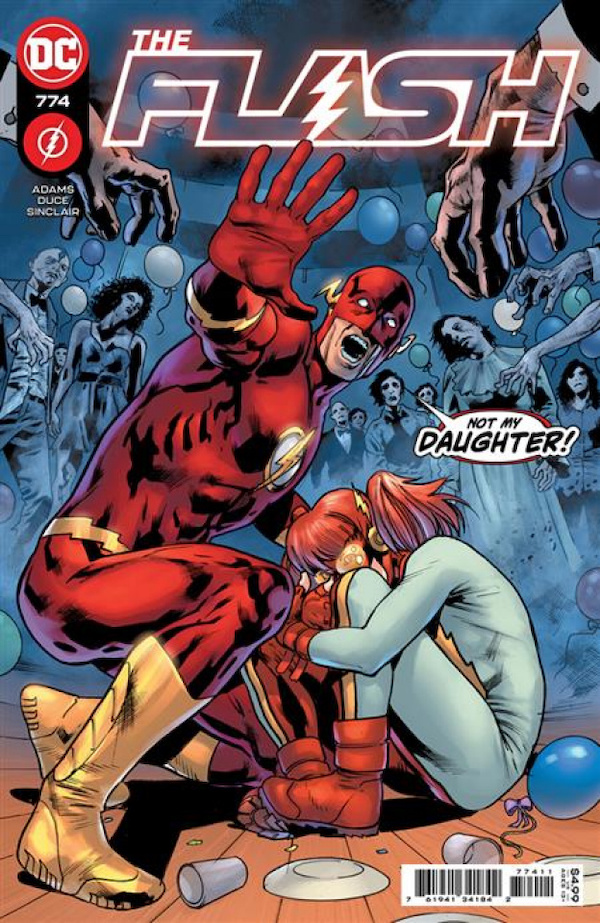
KS: For a high-profile writing gig on a title like The Flash, did someone approach you about doing it or vice versa? You obviously had a long list of writing credits to show, but how did the transition happen?
JA: It was actually very funny. I was brought in along with a cadre of other animation writers to take the reins of a few DC books during a company shakeup called “5G.” I pitched some things and started moving forward with them, but then there was another company shakeup and those projects were seemingly dead. But, my name was still on a list. And that list landed on my first editor’s desk, and he called my good friend Tim Sheridan and asked about the names. Tim gave me a good recommendation, and I was called to do a couple of Future State backups. From there, I got a call that pretty much went like this, “Uh…you have any ideas for the Flash?” Of course I did. I have ideas for every character. I’m an uber-nerd. I pitched my idea and the response was, “Great. That’s better than what we got. You want to write The Flash?” And there I went!
KS: What was your background with the character before coming aboard?
JA: The Flash has always been in the periphery. He’d show up in cartoons, books, etc. He wasn’t a character I followed with any regularity, but he was always there. I think the version in fell in love with was in Justice League Unlimited. Funny, goofy, etc. Then, when I got the job, I did a deep dive. I love Waid’s stuff, Geoff Johns was always coming up with some insane plots, digging deep into the Barry Allen Silver Age books. I consumed it all!
KS: Now that you’d established yourself on a big title, can you talk about the jump from Flash to Green Lantern?
JA: They were taking me off Flash and offered me Green Lantern on the call. And though I was sad about leaving the West family, I came around to the idea to seeing what that poor schlub Hal Jordan was up to. They were wanting something centered on Hal, and they wanted it to be more Earthbound—which fit in line with a pitch I had from a year earlier. So, I got really excited about it, though. The pressure was mounting to do something good after doing The Flash.
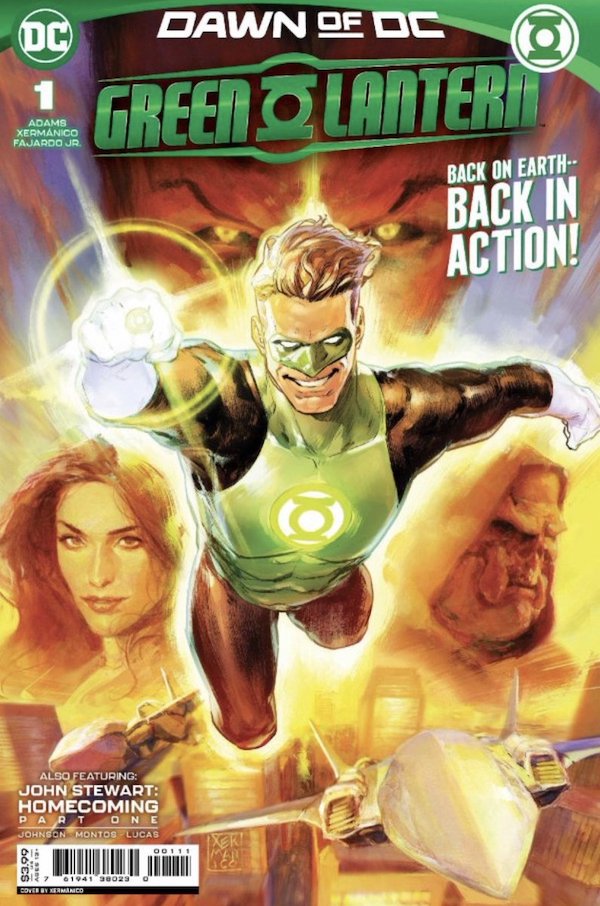
KS: Quick hypothetical: Imagine I can hook you up to a machine Matrix-style and immediately download an expert level skill into your brain. What skill would you like to have that you currently don’t?
JA: Singing. Can you learn singing? That and become an unbelievable guitarist. I just think that’d be cool. Both of those things are unbelievably frustrating to me, because I want to do them, but can’t do them well.
KS: Finally, please let readers know what you have out now and what you have coming for the rest of ‘23 and beyond.
JA: Oh goodness! I have the Jay Garrick mini-series that by the time of this publication, number one is already out. I also have a movie called Mortal Kombat Legends: Cage Match. But wait, there’s more! At NYCC they announced that I’ll be writing a two-year run on an amazing comic I hope everyone will pick up [Flash Gordon, coming in 2024]. And finally, I have a LEGO Jurassic Park special hitting Hulu in November. Aside from my ongoing Green Lantern, I think that’s it!
